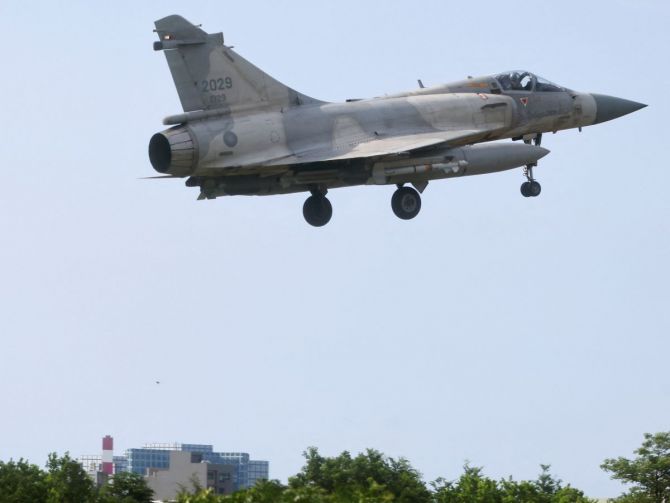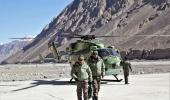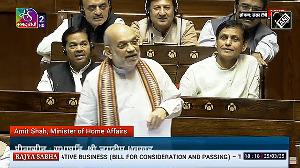'It is only when Beijing sees a country with an infirm political will such as India that it acts up as the PLA has done in eastern Ladakh.'

Will Nancy Pelosi's visit to Taiwan have a domino effect across the world?
Can India use its fallout to turn the tables to its advantage against China?
Dr Bharat Karnad, Emeritus Professor at the National Security Studies at the Centre for Policy Research, the New Delhi think-tank, discusses the possible outcomes of the Pelosi visit.
"The Modi regime has so far done little to punish China by way of cutting off Chinese access to the Indian market in the hope that this show of moderation will dissuade Beijing from resuming offensive military activity in Ladakh and Arunachal Pradesh," Dr Karnad tells Rediff.com Senior Contributor Rashme Sehgal.
The biggest takeaway for India from the Pelosi visit and the subsequent belligerent display of Chinese firepower against Taiwan should be that China can be contained.
Are there lessons India needs to learn from this?
I have always maintained that China is less (strong) militarily than it projects itself and when challenged by a resolute adversary usually thinks better of it and either does nothing or, as in the post-Pelosi trip Taiwan case, lets off steam ex-post facto.
It is only when Beijing sees a country with an infirm political will such as India that it acts up as the PLA has done in eastern Ladakh.
It is obvious that Xi Jinping does not want to precipitate matters till the Chinese Communist party's 20th congress in October and he succeeds in getting an unprecedented third term.
The stakes are too high for him, but will he find different ways to get back at the US?
Is that likely in the near future and what form will that take?
The results of the 20th party congress are a foregone conclusion.
Xi has strengthened his support among the key elements of the State, especially the PLA by cultivating the base and installing leaders/commissars/commanders of his choice in strategic posts.
The question is can Xi get punitive without hurting China's interests? He can't.
The access to US technology and talent is already closed off.
But despite tariff increases, America is the richest market that it (China) simply cannot afford to lose.
So other than a symbolic gesture here, a fired-up confrontational rhetoric there, and continued fire drills and combat aircraft flights crossing the median line and offering the barest provocation in the Taiwan Strait, Beijing will do nothing.

Some experts believe if China receives a rebuff in Taiwan, Xi will seek to scale up China's international status by seeking a military victory against India.
Is this likely to happen?
Is India ready to meet such a challenge given that the Chinese have been strengthening their positions on the Indian territory they took over in 2020?
Xi will get China into even deeper trouble if he thinks he can vent domestic pressure building up because he did nothing to prevent Pelosi from visiting Taipei as he had promised, by initiating hostilities against India.
The Modi regime has so far done little to punish China by way of cutting off Chinese access to the Indian market in the hope that this show of moderation will dissuade Beijing from resuming offensive military activity in Ladakh and Arunachal Pradesh.
When this assumption is proved wrong. Modi will be forced to take conspicuously strong economic measures to severely restrict bilateral trade of nearly $126 billion in 2021 heavily favouring China.
It is in India's interest that China continues to be engaged with Taiwan and the US, so as to decrease the likelihood of a Chinese attack.
By October, winter will have set in the upper Himalayas, will that decrease the likelihood of a Chinese attack on Ladakh/Arunachal Pradesh?
For the reasons adduced above, there's no possibility of China militarily acting up anywhere along the disputed border anytime soon.

If we tie up the knots, is the recent US arms deal with Saudi Arabia and the UAE, the killing of al-Qaeda leader Ayman al Zawahiri and Pelosi's visit, all part of a concerted US attempt to reclaim its leadership in the global arena?
You assume that the US is capable of expertly manipulating developments and juggling various policy balls in Arab West Asia, Israel, India, Iran, China, Taiwan when, in reality, like India, it is in the business of dousing this or that bushfire as the occasion demands.
There's no hard strategy as such because as Henry Kissinger famously said America is too wealthy, too powerful, to need to plan or even strategise!
Nancy Pelosi's visit factored in the fact that economic conditions in China are not so good and China being an export driven economy will not be in a position to face economic sanctions.
That's what most effectively deters a mercantilist China -- the threat of the loss of markets.
Some experts believe QUAD has not created the kind of momentum expected from it.
True. But was it ever really expected to? It is precisely the reason why I advocated in my 2018 book -- Staggering Forward: Narendra Modi and India's Global Ambition, that a better geostrategic arrangement to serve Indian interests is for India to securitise two schemes -- a modified quadrilateral or Mod Quad with the US, retaining a role of the extra-territorial balancer it has always performed but otherwise replaced in the Quad by a group of capable Southeast Asian States, including Vietnam, Indonesia, and the Philippines, and BRIS (Brazil, Russia, India South Africa) -- BRICS minus China.
BRIS will work because Russia is as keen as the US in ensuring India is enabled to balance China's growing power in Asia and the Indo-Pacific.

Will growing tensions between China and Taiwan affect the supply of semi conductor chips given that Taiwan is the largest producer of these chips in the world?
China is setting up its own very large fab units to produce high calibre chips.
In the period it will take to erect these facilities, it has to rely on TMSC and other Taiwanese chip producers because it cannot anymore get them, nor the chip manufacturing wherewithal from the US.
Already we are witnessing a major conflict raging between Russia and Ukraine. Given global warming etc, is this the time to precipitate more military action in the eastern hemisphere?
Global warming will exacerbate the tensions between the developed North and the developing South with mass migrations from climate-affected countries of Asia, the Maghreb and sub-Saharan Africa, and Central and South America to the more prosperous nations of Europe and North America.
Feature Presentation: Aslam Hunani/Rediff.com











 © 2025
© 2025